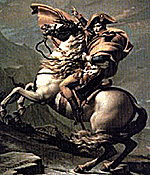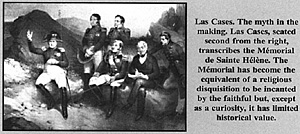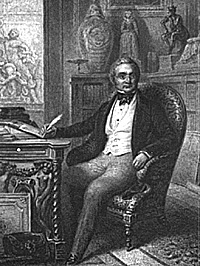Napoleon Man of War
Introduction
By John Cook, UK
| |
His altogether unbalanced views of the ‘man of peace’ are explicable because he draws heavily on statements made by Napoleon himself, which are frequently deliberately false, for perfectly sound military or political reasons, full of ulterior motives and propaganda, such that they are useless at face value as evidence of anything. We can also find this sort of thing in his later attempts to justify his actions.
In the Mémorial de Sainte-Hélène, for example, he invariably describes a British enemy with limitless financial resources, fomenting wars that would otherwise not have occurred and which he strove to avoid. Nothing could be further from the truth. Britain may have provided the wherewithal for the continental powers but the principal architect of the wars between 1804 and 1815 was Napoleon himself.
What is more difficult to say is whether his provocations were by design or lack of judgement, but the unavoidable conclusion is that it seems that the latter had a large part to play in some of his decisions, combined with an extraordinary degree of arrogance.
Many of the modern misconceptions are often shared by those better acquainted with the period than the average interested reader, who often know a considerable amount about the major campaigns, and perhaps something about the lesser ones, but frequently lack sufficient knowledge to fit the Revolutionary and Napoleonic Wars into a European context, rather than a purely Anglo-French one, and do not understand the regional factors outside the purely military sphere.
Who then is at fault for this unbalanced view?
Some mid-19th Century historians writing from a singularly Napoleonic perspective deserve part of the blame for the modern myth. The influence of these writers has tended to result in a kind of unreasonable ethnocentric polarisation, in which those who are not francophile admirers of Napoleon are frequently seen by those who are, as Francophobe in general, and anti-Napoleon in particular.
This does not necessarily follow, but the sheer quantity of repetitive modern material by 20th Century authors sympathetic to Napoleon, spawned by their 19th Century mentors, and the shibboleths born of their personal predilections all of which usually stem from this same root, has tended to condition people to relate to a supposed Napoleonic ideology which never existed. All these factors, however, only partially explain the warped perceptions.
The greatest factor contributing to this unbalanced view of the period is, undoubtedly, the collective failure of English speaking historiography to present its readers with a comparable and balanced account from the viewpoint of the continental powers, together with a description and explanation of their motives and vital national interests.
The principal purpose of my brief overview, therefore, is to restore the balance just a little by describing some of the omissions from Mr. Weider’s article, and show how Napoleon’s policies were seen by the continental powers as consistently provocative and threatening, and were the principal causes of the Napoleonic wars. The factors described here are merely the most obvious, and well known ones, chosen from an extensive menu.
I will concentrate on Mr. Weider’s submission that Napoleon was a “man of peace” and show that he was largely the author of his own misfortune as a result of flawed diplomacy, lack of judgement and, above all, increasingly insatiable and aggressive ambition.
In addition to the submission that Napoleon was essentially a man of peace, there are also a number of other points which are very debatable. Mr. Weider’s claims for special dispensation in the context of Jews, to the extent that Napoleon anticipated the modern state of Israel cannot be taken seriously. This nonsense smacks of Zionist clap-trap of the kind that has been responsible for some of the difficulties seen in the middle east since the formation of Israel in 1948, and is being played out again in Gaza and the West Bank as I write.
Napoleon's Attitude
Napoleon’s attitude towards all religious groups was a matter of, in his own words, “social order” and pretty cynical on the whole. The treatment received by French Jews was no different in essence from that received by French Protestants and it was aimed at centralised governmental control and had no emacipatory qualities about it at all. There is, unfortunately, not enough room to elaborate on these and other questionable claims in Mr. Weider’s article.
It seems appropriate to start with the failure of the Treaty of Amiens which, as far as Britain was concerned, ended the 1798 War of the Second Coalition. It is also appropriate because the collapse of the treaty marks the approximate watershed between the potentially constructive features of his regime and the point when Napoleon became little more than a warlord. It is impossible, nevertheless, not to make brief mention of the Revolutionary Wars because the Second Coalition was, to all intents and purposes, a continuation of the conflict which began in 1792. The causes of the outbreak of war in 1792 were complex and I refer readers to TCW Blanning’s The Origins of the French Revolutionary Wars for a comprehensive exposition.
First, though, a brief look at how the modern myth originated.
When Napoleon died on Saint Helena in 1821, few outside France regretted his passing and his death generated little interest in Europe as a whole. In 1823, however, Emmanuel de Las Cases’ Mémorial de Sainte-Hélène was published, which as much as any other document probably marked the start of the renaissance. The Mémorial was little more than a platform for Napoleonic propaganda in which the exile, using Las Cases as his agent, portrayed himself as, amongst other things, a man of peace who sought nothing more than a unified Europe, who was forced into war by circumstances beyond his control, largely the antagonism of European monarchies and, in particular, the British.
As well as Las Cases’ Mémorial were the works of the French romantic novelists such as Honoré de Balzac, Stendhal (Marie Henri Beyle) and Victor Hugo. These novelists, on the whole, gave Napoleon a paternalistic, philanthropic and liberal character, though not a flawless one it is true. He was portrayed as man with a mission to dismantle a feudal Europe for popular benefit, fighting against decrepit and reactionary continental monarchies.
Added to this is the image of the great captain which the young republican general carefully nurtured from even the very earliest days in Italy. This is undeniably much more compelling but his ability to make war is not at issue here.
In July 1830 there was a revolution in France, which marked the beginning of the end for the French constitutional monarchy, although it would be a further 18 years before the emergence of the Second Republic. In the aftermath of the 1830 revolution the idea emerged of repatriating Napoleon’s remains to France. Sympathy for things Napoleonic was also generated at about this time by the premature death from tuberculosis of Napoleon’s son, The King of Rome (also called Napoleon II), who died in Austria in 1832, and the growing appearance of numerous popular memoirs, of uneven value, written by former Napoleonic soldiers who tended to glorify Napoleon, his wars and, of course, themselves.
On 15 December 1840 the coffin containing Napoleon’s remains arrived in Paris and, followed by veterans of the Grande Armée, it passed by cheering crowds on its way to his final resting place at Les Invalides.
In the meantime, on 2 December 1851, the anniversary of Austerlitz, the son of Napoleon’s brother Louis, who had already attempted two earlier coups against the monarchy in 1836 and 1840, led a third and successful coup d’état, which overthrew the government of the Second Republic. Louis Napoleon was initially installed as President of the Second Republic, the mandate for which ceased in 1852, and following a plebiscite which had not a little Napoleonic déjà vu about it, he declared himself Napoleon III in deference to the late King of Rome, and established the very second-rate Second Empire which fell in the calamitous defeat of 1870, but not before it too had been instrumental in reviving nostalgic and selective memories of his much more capable and illustrious uncle.
These are but some of the factors and trends which resulted in the extraordinary renaissance of Napoleon’s reputation, and the establishment of the legend during the mid and late 19th Century in which he became a combination of liberal revolutionary, guardian of religious tolerance, charismatic leader, paternal philanthropist, soldier of fortune, symbol of freedom, fallen hero and so on, and so on.
The myth passed initially into French folklore and has been exported and accepted without much examination by latter-day romantics everywhere, who will doubtless continue to prefer it to any amount of fact. That is, of course, their prerogative and for them, if not quite a deity, Napoleon has certainly become a powerful icon and a hero more glamorous than any of fiction.
Napoleon, of course, was not responsible for the Revolutionary Wars, he did not even play a significant part in them until the closing campaigns and then merely as another, though particularly successful, French general in the service of the Directorate.
The initial responsibility was that of the Brisotins who whipped up a war frenzy, on the basis of an Austrian threat which did not exist, for their own political purposes. The often given explanation of a clash of ideologies is just not sustainable. The alleged threat of revolutionary ideology did not motivate the old regime continental monarchies, who perceived France at this time as politically chaotic and militarily weak, to the extent that it disqualified itself as a European power of any consequence which posed no threat to their own constituencies. They also all had other matters to deal with, raisons d’etat domestic and external, which were far more pressing than any threat from France. It was only when the clear threat of French revolutionary military power and aggression, rather than revolutionary ideology per se, became evident that the old regime monarchies sat up and took notice.
There was, then, no external foreign threat to France and the declaration of war on Austria by the National Assembly in 1792 resulted from a twofold domestic purpose. The first was to divert domestic attention from increasing social problems and the second was to enable the Brisotins to assume absolute powers such that they could use them against their political enemies. They saw the Habsburgs, and other old regime continental monarchies, as rotten institutions which required little more than a nudge in order for them to collapse, with the associated prospect of French territorial gain. It is also true that there was a degree of ideological fanaticism involved, in which these extremists viewed the export of popular revolution beyond France as a legitimate mission.
Britain’s system of government was by parliamentary democracy, although full popular franchise was more than a century away, and it was in no way comparable to the absolute monarchies of continental Europe. She already had a constitutional monarchy with ever decreasing personal powers, which were far less than those of the continental monarchs, and the Revolution was initially greeted with popular enthusiasm, particularly when the French established a constitutional monarchy of their own. The French were seen as taking a welcome step on the path to what was, by the standards of those days, a democratic system.
Jacobin clubs abounded in Britain and numerous personalities in and out of politics, particularly amongst the Whigs and the literary community, spoke or wrote favourably about the new regime. Britain’s overriding interest in continental Europe was the maintenance of the balance of power so that access to continental markets continued for her domestic and colonial products. It was a twofold and simple issue - status quo and commerce.
Britain’s initial attitude towards Revolutionary France, although opinion was to change from enthusiasm through ambivalence to hostility with the increasing belligerence and excesses of the French regime, was one of business as usual and certainly included no prospect of military intervention, which would interfere with Britain’s laissez-faire approach to commerce, the dominance of which was a principal cause of conflict between France and Britain, and had been for decades.
As recently as 1791, however, the most likely scenario for war in Europe had been one between Britain, Prussia and Russia but by late 1791 even this had receded and Britain adopted an exasperated isolationist stance in the context of continental affairs. In 1792, in an attempt to avoid involvement in the war, Britain declared her neutrality.
Austria continued her policy of achieving objectives through diplomacy but misread French intent. The Revolutionary Wars, which erupted suddenly in 1792 when the National Assembly declared war on Austria, followed by declaration of war on Britain in 1793, were to disabuse the protagonists of their perceptions of each others’ weaknesses. After Russia left the coalition the war ended in October 1797 with the signing of the Treaty of Campoformio between Austria and France but there had been no decisive military result for either side. The terms of the treaty required Austria to cede her Belgian possessions, which she had long sought to off-load much to Britain’s alarm, territory in Italy and to recognise the Cisalpine Republic. Secret clauses included the cession of territory on the Rhine in exchange for French support to Austrian claims to Salzburg and parts of Bavaria, which would be compensated with lands from elsewhere in the Holy Roman Empire.
Negotiations with Britain failed and before Austria and France had reconciled the territorial ‘musical chairs’ in Germany the War of the Second Coalition broke out in 1798.
More Napoleon Man of War
|
 Mr.
Mr.  The Genesis of a Myth
The Genesis of a Myth As Thiers (at right)put it, who is as Francophile an observer as it is possible to find, the guaranteed neutrality of Britain, the uncertainty of Prussia and the well known peaceful policy of Austria, pointed to a period of peace.
As Thiers (at right)put it, who is as Francophile an observer as it is possible to find, the guaranteed neutrality of Britain, the uncertainty of Prussia and the well known peaceful policy of Austria, pointed to a period of peace.